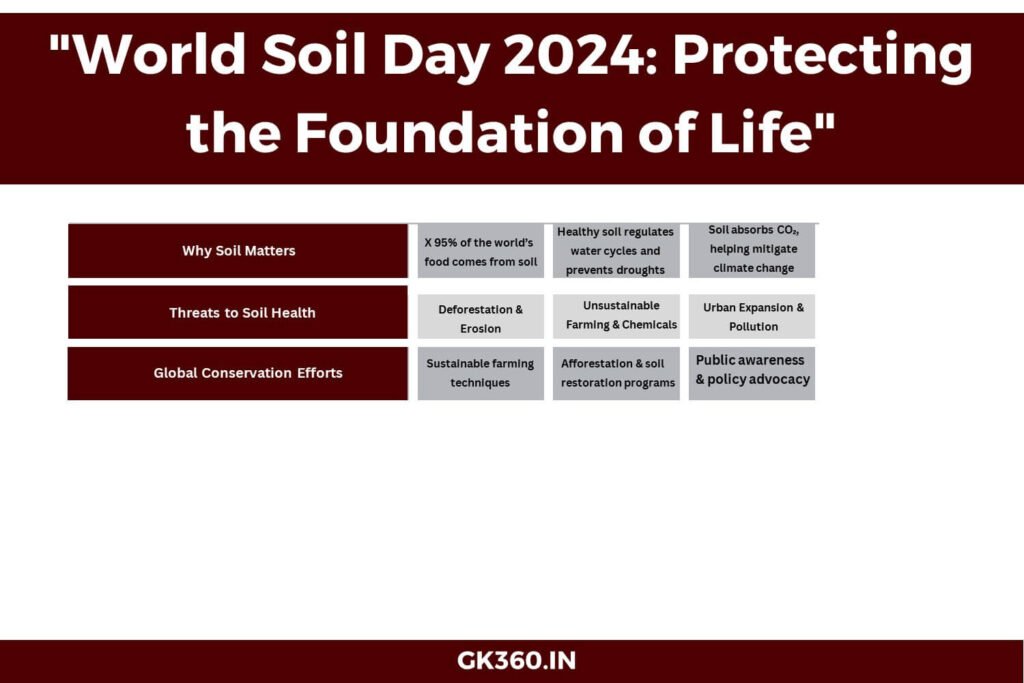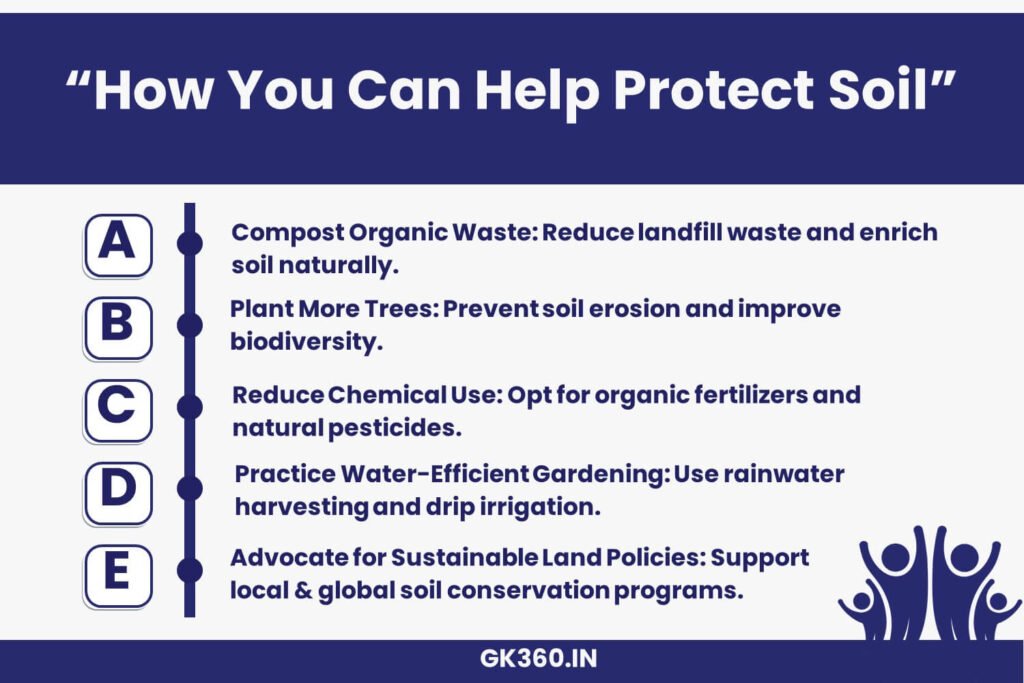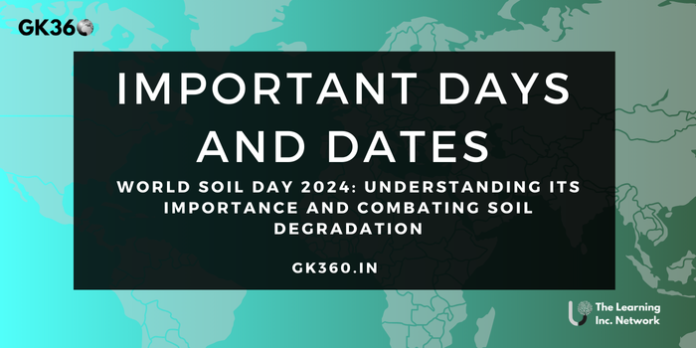World Soil Day 2024: Protecting the Foundation of Life
Introduction
World Soil Day (WSD), celebrated annually on December 5, highlights the importance of soil health for ecosystems, agriculture, and global food security.
- 🌱 Initiated by: The International Union of Soil Sciences (IUSS) in 2002.
- 🌱 Recognized by: The United Nations in 2013.
- 🌱 Theme for 2024: “Soil and Water: Safeguarding the Foundation of Life” – emphasizing the critical link between soil health and water management.
Soil is not just dirt—it is the backbone of agriculture, biodiversity, and climate stability. However, soil degradation is a growing concern that threatens food security, water availability, and ecosystem balance.

Table of Contents
- The Importance of Soil
- The Challenges of Soil Degradation
- Efforts to Combat Soil Degradation
- Theme of World Soil Day 2024: Soil and Water
- Individual Contributions to Soil Conservation
- FAQ Section
- Conclusion
The Importance of Soil
🌍 Soil is a vital resource that plays a fundamental role in:
- ✔️ Supporting plant growth – Providing nutrients for crops and forests.
- ✔️ Regulating water cycles – Retaining and filtering rainwater.
- ✔️ Filtering pollutants – Preventing contamination of water sources.
- ✔️ Mitigating climate change – Acting as a carbon sink, reducing CO₂ levels.
📊 Did you know? Over 95% of the world’s food comes from soil! Healthy soil is essential for higher crop yields, improved nutrition, and resilience against climate change.
The Challenges of Soil Degradation
According to the Food and Agriculture Organization (FAO), one-third of the world’s soil is degraded due to:
- 🚜 Deforestation – Removing trees for agriculture and urban expansion increases soil erosion.
- 🚜 Unsustainable Farming Practices – Excessive chemical fertilizers and monocropping weaken soil structure.
- 🏗️ Urbanization – Expanding cities seal fertile land under concrete, reducing agricultural space.
- ☠️ Pollution – Industrial waste and pesticide overuse harm soil fertility and biodiversity.
Efforts to Combat Soil Degradation
🌱 Governments and organizations worldwide are working to restore and protect soil health through:
- ✔️ Sustainable Farming – Crop rotation, agroforestry, and organic farming.
- ✔️ Reforestation Projects – Planting trees to prevent soil erosion.
- ✔️ Public Awareness Campaigns – Educating communities on soil conservation.
Theme of World Soil Day 2024: Soil and Water
The 2024 theme, “Soil and Water: Safeguarding the Foundation of Life”, emphasizes the connection between soil and water conservation.
- 🔹 Healthy soil stores water efficiently, preventing floods and droughts.
- 🔹 Degraded soil cannot retain water, leading to desertification and lower crop productivity.
✔️ The FAO’s goal is to promote water-efficient soil management for sustainable agriculture and ecosystem preservation.
Individual Contributions to Soil Conservation
While large-scale initiatives are important, individuals can help by:
- 🌱 Composting – Convert organic waste into natural fertilizer.
- 🌳 Planting Trees – Prevent soil erosion and enhance fertility.
- 🚫 Reducing Chemical Use – Use organic fertilizers and natural pesticides.
- ♻️ Reducing Waste – Minimize plastic pollution, which contaminates soil.
✅ Small actions lead to a big impact!

FAQ Section
Q1: Why is soil important for human life?
A: Soil supports food production, stores water, filters pollutants, and regulates the climate.
Q2: What causes soil degradation?
A: The main causes include deforestation, excessive chemical farming, urban expansion, and industrial pollution.
Q3: How does soil impact climate change?
A: Healthy soil absorbs carbon dioxide (CO₂), reducing global warming, while degraded soil releases carbon back into the atmosphere.
Q4: What is the role of World Soil Day?
A: It raises awareness about soil conservation and promotes sustainable land management.
Q5: How can individuals help protect soil?
- ✔️ Compost organic waste
- ✔️ Plant more trees
- ✔️ Use sustainable farming techniques
- ✔️ Avoid excessive chemical use
Conclusion
🌱 World Soil Day 2024 reminds us of our responsibility to protect and nurture soil for a sustainable future.
- ✔️ Soil is essential for food, water, and climate stability.
- ✔️ Soil degradation threatens food security and biodiversity.
- ✔️ Sustainable practices can restore soil health.
✅ By adopting soil-friendly practices and supporting conservation initiatives, we can secure a healthier planet.
Key Takeaways Table
| Aspect | Details |
|---|---|
| Event Name | World Soil Day 2024 |
| Date | December 5, 2024 |
| Theme | “Soil and Water: Safeguarding the Foundation of Life” |
| Why Soil Matters | Essential for food production, water regulation, pollution filtration, and climate stability. |
| Global Soil Threats | Deforestation, overuse of chemicals, urbanization, pollution, climate change. |
| FAO Soil Conservation Goals | Promote sustainable farming, restore degraded soil, improve water management. |
Related terms
- World Soil Day 2024 Theme
- Importance of Soil in Ecosystems
- Sustainable Farming and Soil Health
- Climate Change and Soil Erosion
- FAO World Soil Day Campaign
- Role of Soil in Global Food Security





